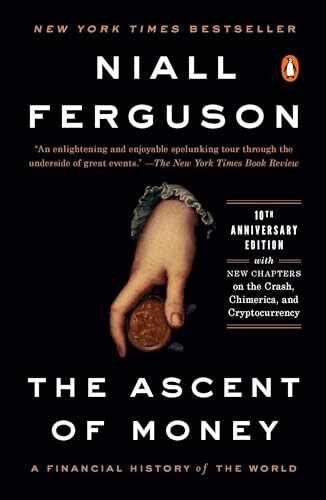
I don’t know a great deal about economics or finance, so for me, this book was a mixed bag. Some parts were interesting, some parts were boring, and I often wished the book had more analogies and simplified explanations of how various financial mechanisms work (e.g., hedge funds, derivatives).
The main value of this book for me is understanding, at least a little better, the historical context of money and finance. Growing up in the modern world, it’s easy to assume that world economics have always been this way. You tend to forget that money and finance are technologies. Money, credit, bonds, stocks, and insurance all had to be invented and evolved over time. Like any technology, money has its dark sides, but that does not make it inherently evil. In fact, money and economics have been instrumental in enabling most of the other innovations we rely on.
The book covers a large number of topics—the Medici’s, Napoleonic wars, Dutch East India Company, Great Depression, Enron, Church of Scotland insurance, subprime mortgage crisis—so you get a broad overview of the history of economics, but no one topic is covered in much depth. Some of the key items discussed:
- The invention of money. E.g., Using precious metals for trade, and the advantages this has over barter.
- Money is a belief. Eventually, people realize that money is not just precious metals or any material. It’s not even cash. Money is belief. In the modern world, only ~11% of money is cash.
- Credit and debit. Credit and debt are critical to enabling business, technology, and most aspects of modern civilization. When you put your money in a bank, the bank loans it out to others: in a sense, channeling money from the idle to the industrious.
- Bonds. Governments and institutions issue bonds to raise money, in exchange for a promise of repayment and/or interest. The bonds themselves can be traded and their value will go up and down based on whether people trust the issuer of the bond to come through on their obligations.
- Stock. The joint stock company was invented as a way for many people to pool money and resources to pursue risky, long-term ventures.
- Insurance. Insurance, statistics, and probability are used to pool money and risk.
- Hedge funds. A hedge funds is a private investment firm that uses a variety of complex and aggressive strategies to get a high return. This includes the use of derivatives, such as futures (an agreement to buy or sell an asset at a specific time in the future) and options (giving someone the option, but not the obligation, to buy or sell at a specific price within a certain timeframe).
- Homeownership. The role of homes in society, including being used as collateral for credit (you can default on your payments and run away, but your house can’t).
- The finance industry. The financial industry is ubiquitous in the modern world, making up 7-9% of GDP in the US and UK. Roughly 20% of male Harvard grads go into finance.
- Bankruptcy. In the US, bankruptcy laws were originally designed to encourage entrepreneurs, but today, 98% of bankruptcies are not business related. It’s all individuals incapable of dealing with debt.
Quotes
As always, I saved a few of my favorite quotes:
The ascent of money has been essential to the ascent of man.
Money is a matter of belief, even faith: belief in the person paying us; belief in the person issuing the money he uses or the institution that honors his cheques or transfers. Money is not metal. It is trust inscribed. And it does not seem to matter much where it is inscribed: on silver, on clay, on paper, on a liquid crystal display.
Poverty is not the result of rapacious financiers exploiting the poor. It has much more to do with the lack of financial institutions, with the absence of banks, not their presence. Only when borrowers have access to efficient credit networks can they escape from the clutches of loan sharks, and only when savers can deposit their money in reliable banks can it be channelled from the idle rich to the industrious poor.
Banks have evolved since the days of the Medici precisely in order (as the 3rd Lord Rothschild succinctly put it), to ‘facilitate the movement of money from point A, where it is, to point B, where it is needed’. Credit and debt, in short, are among the essential building blocks of economic development, as vital to creating the wealth of nations as mining, manufacturing or mobile telephony.
Macro economists have correctly predicted 9 of the last 5 recessions.
